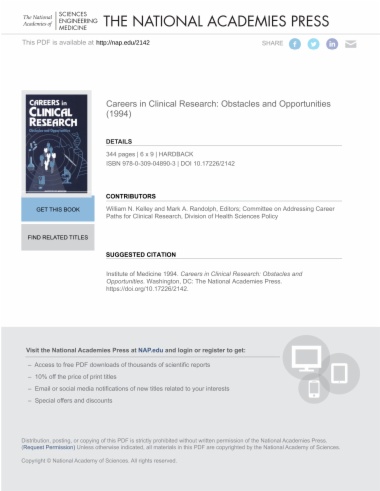Transforming biological discoveries into medical treatment calls for a cadre of health professionals skilled in patient-oriented research. Yet many factors discourage talented persons from choosing clinical research as a profession.
This new volume lays out the problem in detail, with specific recommendations to the federal government, the biotechnology and pharmaceutical industries, professional organizations, the health care industry, organized medicine, and the nation's universities and academic health centers.
The volume explores
- How clinical research is conducted, what human resources are available, and what research opportunities lie ahead.
- Why health professionals become discouraged about clinical research.
- How the educational system has failed in this area and what programs stand out as models.
- How funding affects the supply of researchers.
This practical book will be of immediate interest to public and private agencies funding research, research administrators, medical educators, health professionals, and those pursuing a career in clinical investigation.
- Cover
- Front Matter
- Executive Summary
- Introduction
- Nurturing Clinical Researchers
- Clinical Research Funding and Infrastructure
- Training Pathways
- Academic-Industry Relationships
- References
- Appendix A: Report of the Task Force on Clinical Research in Dentistry
- Appendix B: Report of the Task Force on Clinical Research in Nursing and Clinical Psychology
- Appendix C: Report of the Task Force on Clinical Research in Surgery
- Appendix D: Agenda for the Workshop on Clinical Research and Training: Spotlight on Funding
- Appendix E: Contributors
- Appendix F: Biographies of Committee Members
- Glossary
- Index

